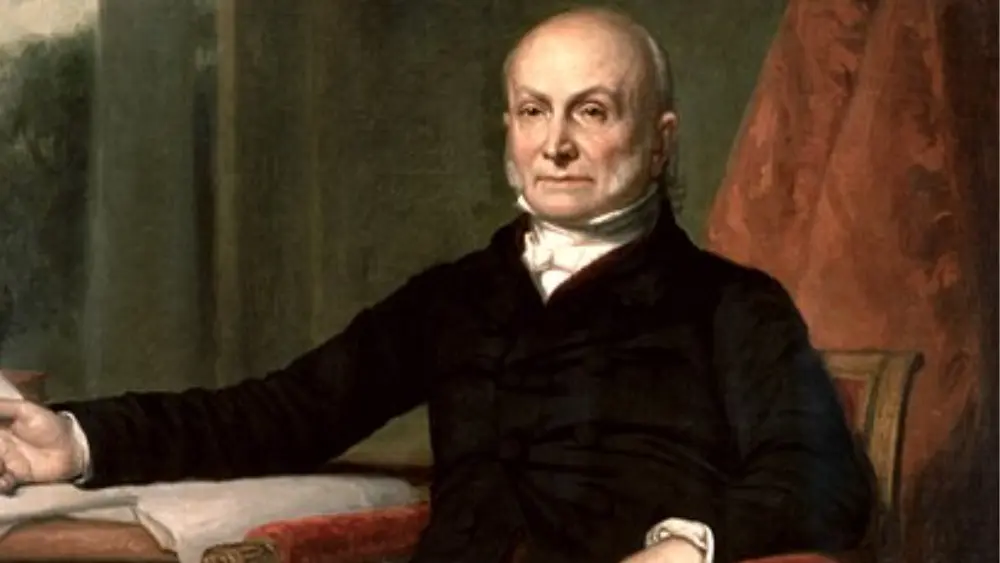John Quincy Adams, the sixth U.S. President, embodied founding principles as a statesman, diplomat, and advocate for the nation. Born on July 11, 1767, in Braintree, Massachusetts (now Quincy), Adams’ life was immersed in U.S. history and included decades of public service.
Early Life and Upbringing
John Quincy Adams’s early life instilled American independence ideals and a vision for the nation’s brighter future. John Adams’s father played a key role in the revolution and became the second President of the United States.
The Adams family’s dedication to the U.S. shaped John Quincy Adams’s values and influenced his aspirations in early history. He inherited a legacy of public service and commitment to founding principles, shaping him into a respected diplomat, statesman, and sixth U.S. President.
John Quincy Adams: Education and Diplomacy
John Quincy Adams’s education and early career were marked by a remarkable commitment to intellectual growth and a dedication to diplomacy. His family’s deep involvement in American politics greatly influenced his upbringing and provided him with a comprehensive education. This education instilled in him a strong foundation in law, politics, and international relations. Eager to put his knowledge to use, Adams embarked on a distinguished diplomatic career, which would become a hallmark of his early adulthood.
His diplomatic service took him to various posts in Europe, including the Netherlands, Prussia, and Russia. In these roles, Adams demonstrated a keen intellect, diplomatic finesse, and a commitment to representing American interests abroad. His experiences in Europe not only honed his diplomatic skills but also exposed him to the complexities of international relations during a transformative period in world history. John Quincy Adams’s early education and diplomatic career laid the groundwork for his later achievements in American politics and diplomacy. He played a pivotal role in shaping the nation’s foreign policy and contributing to its growth on the global stage.
Treaty of Ghent
John Quincy Adams played a pivotal role in one of the most significant diplomatic achievements in American history—the negotiation of the Treaty of Ghent. This historic treaty effectively ended the War of 1812 between the United States and Great Britain, bringing an end to hostilities and preserving American sovereignty. Adams’s involvement in these negotiations showcased his exceptional diplomatic skills and his unwavering commitment to securing favorable terms for the young United States.
The Treaty of Ghent not only halted the war but also established a framework for peaceful relations between the United States and Great Britain. Adams’s contributions to this treaty were instrumental in achieving a resolution that protected American interests and paved the way for a period of relative stability and cooperation between the two nations. His diplomatic skill and commitment to preserving American sovereignty made a lasting impact on the nation’s history, highlighting the crucial role of diplomacy in protecting the interests and principles of the United States on the global stage.
John Quincy Adams: Secretary of State
John Quincy Adams’s tenure as Secretary of State under President James Monroe marked a defining chapter in American foreign policy. In this influential role, Adams demonstrated his exceptional diplomatic acumen and played a pivotal role in formulating the Monroe Doctrine. This historic policy asserted the U.S. stance on European interference in the Western Hemisphere, marking 19th and 20th-century foreign policy.
Adams, drafting the Monroe Doctrine, warned against European interference in the Western Hemisphere, deeming it a threat and prompting U.S. intervention. This declaration asserted U.S. sovereignty and established it as a major global player in geopolitics. John Quincy Adams’s role in crafting and promoting the Monroe Doctrine left an enduring legacy in American foreign policy, shaping the nation’s approach to international relations for generations to come. His contributions as Secretary of State underscored his profound impact on the development of American diplomacy and the defense of its interests on the world stage.
Election as President
John Quincy Adams’s election as the sixth President of the United States in 1824 marked a pivotal moment in American political history. This election was unlike any other, as it concluded in a contentious and highly unusual manner. In a crowded field of candidates, no single candidate received the required majority of electoral votes, triggering a constitutional provision that sent the election to the House of Representatives for resolution.
The election in the House of Representatives was characterized by various factions engaged in complex political maneuvering and negotiations. Ultimately, Adams secured victory in the House, making him the President of the United States. His election represented a shift in American politics, as it marked the end of the “Era of Good Feelings” and the beginning of a more partisan and contentious era.
John Quincy Adams: Domestic Policy
John Quincy Adams pursued a strong domestic policy agenda to drive U.S. growth and development during his presidency. He staunchly advocated for several key initiatives aimed at strengthening the nation’s institutions and fostering economic progress. He proposed a national university to shape future leaders and foster intellectual growth, emphasizing education’s crucial role in the nation.
Adams advocated for internal improvements like roads, canals, and transportation networks to boost national infrastructure and development. He saw infrastructure investments as vital for nationwide economic growth and American opportunity expansion. Adams supported an active federal role in economic development, endorsing government promotion of industry and prosperity. His domestic agenda aimed for a strong, united, forward-looking U.S., shaping discussions on education, infrastructure, and economic government involvement.
Championing Anti-Slavery
John Quincy Adams courageously championed anti-slavery during a divisive era, emerging as a principled leader amid political peril. His unyielding anti-slavery stance, despite political risks, made him a moral leader in American politics. Adams boldly opposed slavery in Congress, advocating for the crucial right to petition against it, empowering anti-slavery expression.
In Congress, Adams staunchly defended citizens’ right to petition against slavery, despite strong opposition from pro-slavery factions. His unwavering anti-slavery commitment elevated moral discourse, paving the way for future abolition efforts and challenging slavery’s institution.
John Quincy Adams: Post-Presidential Years and the House of Representatives
John Quincy Adams’s post-presidential years: remarkable return to public service, unwavering commitment to principles. He served as a U.S. Congressman from Massachusetts, a role that allowed him to extend his influential career in politics. In the House, Adams passionately opposed slavery, advocating for various beliefs central to his cause. In Congress, he crucially voiced anti-slavery sentiments, shaping the nation’s discourse on this divisive issue with his pivotal role.
A major House debate was the Mexican-American War, and Adams strongly opposed it during his tenure. His anti-war stance showcased his dedication to diplomacy and peaceful resolutions, despite facing staunch opposition from pro-war factions. Adams’ post-presidential years solidified his influential status in American politics for justice and human rights through unwavering commitment.

Legacy and Impact
Throughout his distinguished career in public service, Adams championed the cause of liberty, diplomacy, and the defense of democratic ideals. His impact on U.S. foreign policy, notably the Monroe Doctrine, shaped generations of international relations.
Furthermore, Adams’s principled stand on deeply contentious issues like slavery demonstrated his moral integrity and unwavering dedication to justice. His relentless fight against slavery in Congress showcased moral strength amid political challenges, inspiring future civil rights leaders. John Quincy Adams’s legacy: principled leadership, ideals of liberty, diplomacy, justice, and the pursuit of a more perfect union.











